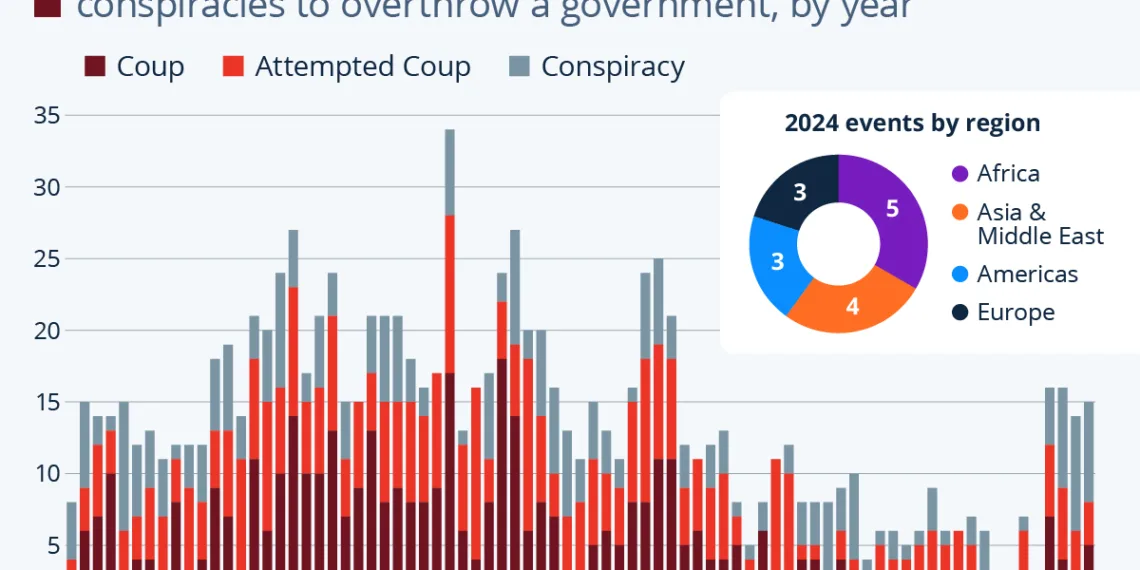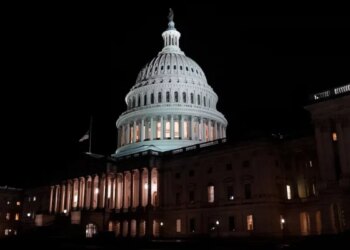Select Language:
Global Surge in Coups: A New Era of Political Instability
The landscape of global governance has seen significant upheaval in recent years, with an observable rise in the number of coups, coup attempts, and conspiracies aimed at overthrowing governments. This development is highlighted by the data gathered by the University of Illinois Cline Center Coup d’État Project, indicating a shift since 2021 that’s markedly different from the relatively stable political environment observed during the 2000s and 2010s.
The Statistics: Coup Trends Over the Years
Recent reports reveal that the frequency of coups and attempts has escalated dramatically, with the annual count ranging between 14 and 16 since 2021. This is a stark contrast to the prior decades, which predominantly featured single-digit figures. The increase in both successful coups and attempts is noteworthy; successful coups reached a peak with seven documented in 2021 and five in 2024. History, however, reminds us that these numbers still lag behind the turmoil of the 1960s and 1970s, a decade characterized by an average of 20 coups annually, including over 18 successful instances in some years.
Success Rates and Figures: A Historical Context
While the recent count of coups is alarming, it does not surpass the historical highs observed in the past. For instance, the decade between 1960 and 1970 alone saw 103 successful coups, while the following decade witnessed 95 successful attempts. In stark contrast, the period from 2000 to 2020 averaged merely 22 successful coups per decade. Extrapolating the trends from 2021, we could potentially witness around 38 successful coups within the current decade—almost double the previous averages.
Geographic Spread of Coups
The data underscores that coups and related attempts are not concentrated in a particular region but have occurred across all continents. The year 2024, in particular, saw significant upheavals in nations like Bangladesh, Syria, and Haiti.
Notable Instances of Successful Coups
Several successful coups in Africa have been pivotal in contributing to the overall climb in numbers. Countries like Gabon, Niger, Burkina Faso, Chad, Guinea, Mali, Sudan, and Tunisia have experienced regime changes that reflect rising instability. Additionally, global events such as the coups in Sri Lanka and Kazakhstan in 2022, the latter classified as an autocoup, highlight a wider trend of political turbulence. Notably, Afghanistan and Myanmar also fell into this category in 2021, indicating that coup-related activities are not confined to a single region.
Attempts and Conspiracies Beyond the Developing World
Interesting patterns also emerge in developed nations, where attempted coups and conspiracies have recently surfaced. For example, an attempted coup in South Korea, alongside conspiracies in Armenia, Belarus, Ukraine, and Moldova, denotes a worrisome trend of political dissent escalating into serious threats against governmental authority. The events of January 6, 2021, in Washington, D.C., provide a case study of this phenomenon, classified as an attempted coup by some analysts.
The Role of Semi-Constitutional Monarchies
The occurrence of coups extends to semi-constitutional monarchies, wherein the dynamics of power-sharing between monarchs and elected officials can lead to significant tensions. A case in point is the emir of Kuwait’s decision in May 2023 to dissolve the parliament just one month following elections, coupled with a suspension of certain constitutional provisions for four years. Such political maneuvers raise questions about the stability of governance structures in hybrid systems.
A Broader Implication: Political Instability and Global Dynamics
The current rise in coup attempts and successful overthrows reflects a broader issue of political instability that resonates with economic, social, and international dynamics. The reasons behind these emerging patterns are multifaceted, involving a combination of governance challenges, socio-economic strain, and external influences that undermine established political systems.
In a rapidly changing global context, understanding the trends in coup occurrences sheds light on the fragility of governance across diverse political landscapes and underscores the importance of addressing the underlying issues that precipitate such upheaval.







